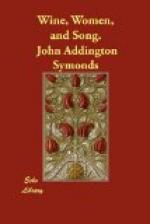’Tis a sign that God
the Lord
Will not let us
perish,
Since with scourge and rod
and sword
He our souls doth
cherish;
He amid this vale of woes
Makes us bear
the burden,
That true joys in heaven’s
repose
May be ours for
guerdon.
Next in order to these poems, which display the Wandering Students as a class, I will produce two that exhibit their mode of life in detail. The first is a begging petition, addressed by a scholar on the tramp to the great man of the place where he is staying. The name of the place, as I have already noticed, is only indicated by an N. The nasal whine of a suppliant for alms, begging, as Erasmus begged, not in the name of charity, but of learning, makes itself heard both in the rhyme and rhythm of the original Latin. I have tried to follow the sing-song doggerel.
A WANDERING STUDENT’S PETITION.
No. 3.
I, a wandering scholar lad,
Born for toil
and sadness,
Oftentimes am driven by
Poverty to madness.
Literature and knowledge I
Fain would still
be earning,
Were it not that want of pelf
Makes me cease
from learning.
These torn clothes that cover
me
Are too thin and
rotten;
Oft I have to suffer cold,
By the warmth
forgotten.
Scarce I can attend at church,
Sing God’s
praises duly;
Mass and vespers both I miss,
Though I love
them truly.
Oh, thou pride of N——,
By thy worth I
pray thee
Give the suppliant help in
need,
Heaven will sure
repay thee.
Take a mind unto thee now
Like unto St.
Martin;
Clothe the pilgrim’s
nakedness,
Wish him well
at parting.
So may God translate your
soul
Into peace eternal,
And the bliss of saints be
yours
In His realm supernal.
The second is a jovial Song of the Open Road, throbbing with the exhilaration of young life and madcap impudence. We must imagine that two vagabond students are drinking together before they part upon their several ways. One addresses the other as frater catholice, vir apostolice, vows to befriend him, and expounds the laws of loyalty which bind the brotherhood together. To the rest of the world they are a terror and a nuisance. Honest folk are jeeringly forbidden to beware of the quadrivium, which is apt to form a fourfold rogue instead of a scholar in four branches of knowledge.
The Latin metre is so light, careless, and airy, that I must admit an almost complete failure to do it justice in my English version. The refrain appears intended to imitate a bugle-call.
A SONG OF THE OPEN ROAD.
No. 4.




